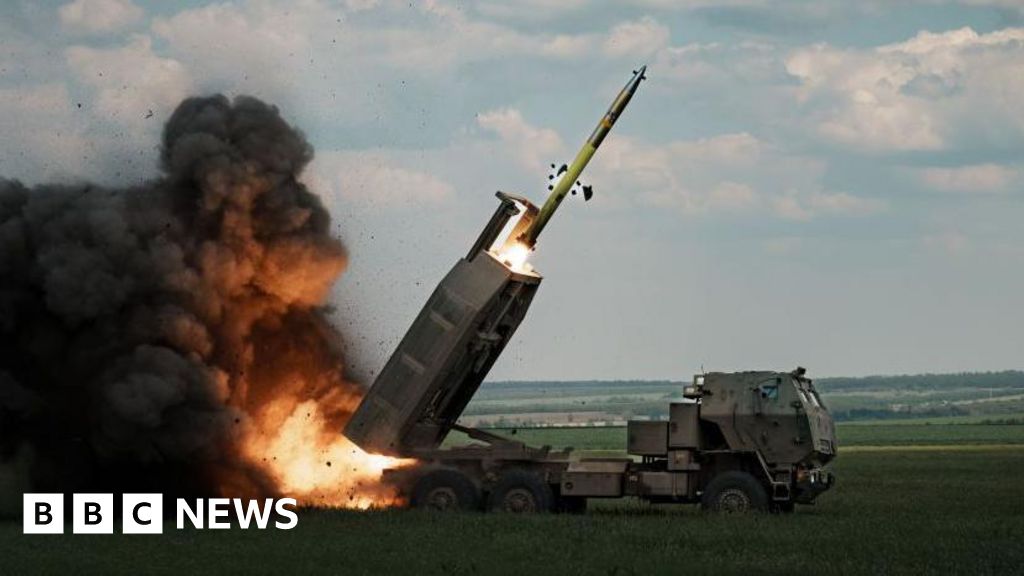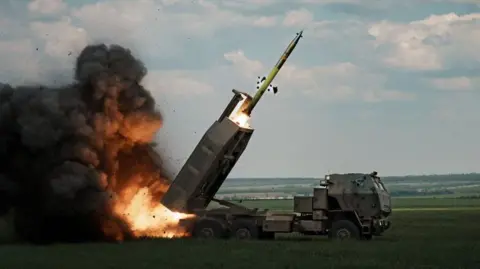Pressure on Biden to let Ukraine strike Russia with US weapons

Laura Gozzi and Tom Bateman,BBC News, London & Washington
US President Joe Biden is facing growing pressure from allies to allow Ukraine to strike targets inside Russia using Western weapons.
A number of European countries, including France, Germany and the UK, have signalled they are open to an easing of restrictions on how Ukraine can use weapons supplied by the West.
They believe Ukraine should be able to launch offensive strikes at Russian military targets across the border to better repel its advances.
But Washington, which has provided the bulk of Ukraine’s weaponry, has resisted easing these restrictions over fears of escalation. It maintains it has not encouraged or enabled Ukrainian strikes on Russian soil.
Pressure on the US to relax the ban on Ukraine striking inside Russia has ramped up in recent days, with France’s President Emmanuel Macron voicing direct support for the move. He said Ukraine should be “allowed” to use weapons supplied by the West against military sites on Russian territory – although strictly not on civilian targets.
That pressure has been compounded by Russia’s recent advances on the battlefield. Moscow has made significant gains in Ukraine’s eastern Donetsk region and in the north-eastern Kharkiv region. Ukraine’s losses were aggravated by partisan paralysis in Washington that has caused a long delay in providing missiles and artillery shells.
While Mr Macron has for some time advocated for more direct intervention in the Ukraine war – other Western leaders also appear to be softening to the idea.
German Chancellor Olaf Scholz has remained cautious in public but a spokesman in Berlin said that “defensive action is not limited to one’s own territory, but also includes the territory of the aggressor”.
UK Foreign Secretary Lord David Cameron said earlier this month that it was up to Ukraine to decide how to use British weapons, while this week the Polish Deputy Defence Minister said that Ukrainians could use Polish weapons “as they see fit”.
The debate over the issue is ongoing within the US administration, with Secretary of State Antony Blinken believed to be among those trying to convince President Biden to ease the restrictions.
Mr Blinken became the first senior administration official to suggest the US could shift its position during a visit to Moldova on Wednesday, telling reporters Washington’s stance on the matter would “adapt and adjust” based on changing battlefield conditions.
“[Ukraine] has to make its own decisions about the best way to effectively defend itself. We’re going to make sure that it has the equipment it needs to do that,” he said.
“As what Russia does has changed in terms of how it’s pursuing its aggression and escalation, we’ve adapted and adjusted, too, and I’m confident we’ll continue to do that,” Mr Blinken added.
 Getty Images
Getty ImagesBut there are significant risks involved in any decision by Mr Biden to ease restrictions on Ukraine’s use of US-supplied weapons.
Ukrainian drone strikes are reported to have already targeted Russian nuclear early-warning radar systems deep inside the country’s territory.
The US administration, according to a report in the Washington Post, has conveyed its concerns to Kyiv about the two attempted attacks against radar stations that provide conventional air defence as well as warning of nuclear launches by the West.
The report quotes an unnamed US official as describing these as sensitive locations “because Russia could perceive that its strategic deterrent capabilities are being targeted, which could undermine Russia’s ability to maintain nuclear deterrence against the United States”.
Russia’s President Vladimir Putin also warned this week that attacks by Ukraine on Russia with Western missiles risked triggering a wider war. “Constant escalation can lead to serious consequences,” he said. “Do they want a global conflict?”
He added that responsibility for any strikes inside his country’s territory would lie with Western arms suppliers, even if Ukraine’s forces carried out the strikes.
Ukrainian President Volodymyr Zelensky has previously said it was “unfair” for Western countries to impose limits on the use of their weapons, while acknowledging that Ukraine could not risk the support of its partners.
Earlier this month, Mr Blinken met President Zelensky in Kyiv. Mr Zelensky raised “security guarantees” involving a longer-term bilateral defence pact which is close to being signed between the US and Ukraine.
Any question of whether Washington would permit Ukraine to use US-weapons for strikes into Russian territory would likely have come up in their private talks.
Some Nato countries remain nervous about that prospect. On Thursday, Italian Prime Minister Giorgia Meloni said she did not think it necessary to hit Russian military bases and urged the West to supply more air defences to Ukraine instead.
The US has already supplied Ukraine with thousands of defensive weapons, tanks and air defence systems. Since April, it has also sent Ukraine the longest-range version of ATACMS missiles, which can travel up to 190 miles (300km).
Related
Kash Patel once questioned Elon Musk having access to data…
Indian-origin Kash Patel took oath as the new chief of the United States’ top investigative agency FBI, the Federal Bureau of Investigation, on Friday. The
‘I visited the oldest American restaurant in Benidorm – the…
Harry, known as Harry Tokky on TikTok, recently visited the "oldest" American eatery in Benidorm, and he couldn't believe what they served up. Not to mention, t
Trump live updates: Melania to host White House dinner after…
Trump accuses 'nice guy' Keir Starmer of 'not doing anything' about Russia-Ukraine warSign up for the daily Inside Washington email for exclusive US coverage an
‘Threat to every American’s freedom’: Associated Press sues Donald Trump…
AP sues Trump officials over White House ban The Associated Press has taken legal action against US President Donald Trump's administration after its reporters










